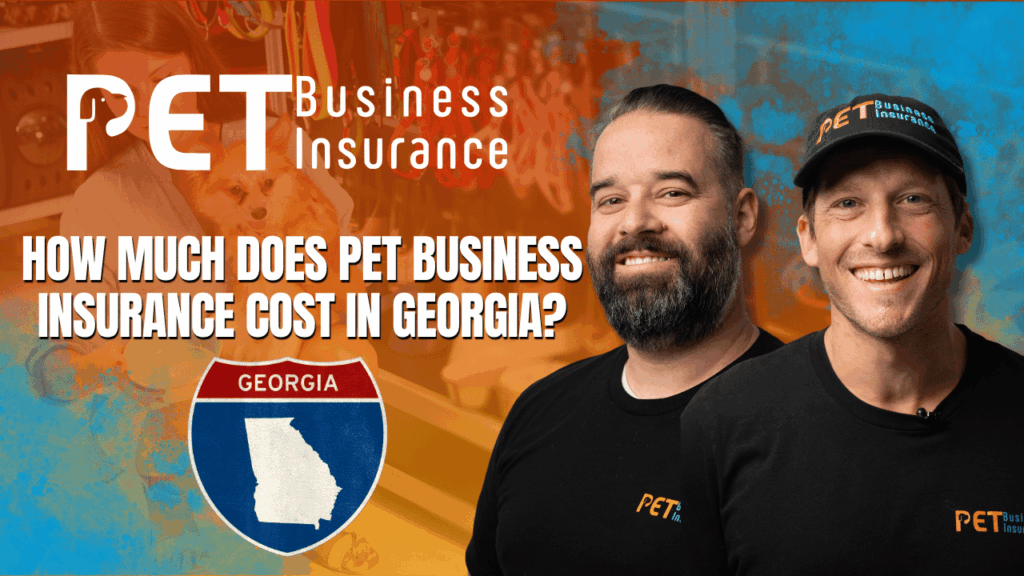
Running a pet business in Georgia is both rewarding and challenging. Whether you’re grooming dogs in Savannah or operating a veterinary clinic in Atlanta, you’re likely facing the same concern: how do you protect your business from unexpected costs and liability?
Insurance plays a central role in risk management. But between state laws, coverage options, and varying costs, finding the right plan can feel overwhelming. Fortunately, there are clear pricing patterns, legal requirements, and cost-saving strategies that can help.
This guide breaks down what pet business insurance really costs in Georgia, the factors that influence those costs, and what types of coverage are essential depending on the services you offer.
Understanding Pet Business Insurance Coverage Types
Pet business insurance isn’t a one-size-fits-all policy. It’s a combination of coverage types designed to protect different aspects of your business.
General Liability Insurance
This coverage protects against third-party claims for bodily injury, property damage, or advertising-related claims.
In Georgia, pet care businesses pay an average of $43 per month or $513 per year for general liability insurance. However, these numbers can fluctuate based on your business model and size.
Most policies include $1 million per occurrence and $2 million aggregate limits. About 71% of pet care businesses pay under $60 per month.
Professional Liability Insurance (Errors & Omissions)
This coverage protects against claims of professional mistakes or negligence.
Common for trainers, groomers, and veterinary clinics, the average cost is $61 per month, or $735 annually. This coverage is especially important for service-based businesses where your advice or care can lead to financial or emotional loss for clients.
Workers’ Compensation Insurance
Georgia law requires this coverage for businesses with three or more employees, including part-time staff.
On average, pet care businesses pay $97 per month, or $1,160 annually, for workers’ comp. It covers medical bills and lost wages for employees injured on the job — a significant risk in animal-handling roles.
Commercial Property Insurance
Protects physical assets like buildings, tools, diagnostic equipment, and furniture.
Veterinary clinics with expensive equipment typically pay $880 to $1,500 per year for $100,000 in coverage. A grooming salon or boarding facility may pay more or less depending on property values and risk.
Business Owner’s Policy (BOP)
Bundles general liability and commercial property into a single, more affordable policy.
On average, pet care professionals pay $86 per month, or $1,031 per year, for a BOP. These policies often include business interruption coverage and are ideal for small to mid-sized operations.
Animal Bailee Insurance
This protects animals in your care if they are injured, lost, or die.
Although not always included in base packages, it is essential for boarding facilities, groomers, trainers, and sitters. Costs vary depending on the number and type of animals handled, but its value is significant in claims involving animal injury.
Insurance Cost by Type of Pet Business
Your business model plays a major role in determining insurance premiums.
Veterinary Practices
These operations face higher costs due to medical services, staff, and property values. Total annual premiums often range from $4,300 to $8,300.
Typical breakdown:
- General Liability: $600–$1,000
- Malpractice Insurance: $385–$840
- Property Insurance: $880–$1,500
- Workers’ Compensation: $2,500–$5,000
Veterinarians treating large or exotic animals typically pay more due to greater risk exposure.
Grooming Businesses
Groomers pay lower premiums overall but still face liability and equipment risks.
- General Liability: $300–$800
- Professional Liability: $200–$500
- Commercial Property: $400–$1,200
- Workers’ Compensation: $800–$2,000
Mobile groomers often save on property insurance but may pay more for commercial auto coverage.
Pet Sitters and Dog Walkers
With fewer employees and lower overhead, this group pays the least.
- General Liability: $150–$400
- Professional Liability: $100–$300
- Bonding Coverage: $50–$150
Annual total costs are often under $500.
Pet Boarding and Daycare Facilities
Due to the number of animals and longer care durations, insurance needs are more extensive.
- General Liability: $800–$1,500
- Animal Bailee Coverage: $500–$1,200
- Property Insurance: $600–$2,000
- Workers’ Compensation: $1,000–$3,000
Premiums can range from $2,000 to $6,000 annually depending on size and capacity.
Georgia-Specific Insurance Requirements
Georgia businesses must adhere to both state laws and local ordinances.
Licensing
Businesses that board, groom, or train animals must have a kennel license issued by the Georgia Department of Agriculture. Pet dealers must also be licensed. Proof of current licensing is often required by insurers.
Workers’ Compensation Law
Any business with three or more employees must carry workers’ compensation. This includes part-time and temporary workers. Penalties for noncompliance include fines, criminal charges, and personal liability for uncovered injuries.
Local Ordinances
Zoning laws, noise regulations, and animal count limits vary by city and county. Some municipalities require minimum liability coverage to operate legally. Insurance providers often factor compliance into pricing or eligibility.
Risk Factors That Influence Premiums
Insurance carriers evaluate several variables when determining your costs:
- Business size and revenue: Higher income and more employees = higher exposure
- Property value: Clinics and facilities with expensive equipment pay more
- Animal types: Larger dogs, exotic animals, or high-risk breeds increase liability
- Claims history: A clean record results in better rates
- Location: Urban areas (e.g., Atlanta) tend to have higher premiums due to population density and crime
- Weather: Flood and storm risks near the coast may require extra coverage
Strategies to Lower Pet Business Insurance Costs
Pet business owners can manage and even reduce insurance costs with smart planning.
Bundle Coverage Types
Combining multiple policies — especially in a BOP — generally lowers premiums and simplifies billing.
Improve Risk Management
Training, safety procedures, and maintenance reduce the risk of claims and may qualify you for discounts.
- Employee certifications in animal handling
- Written protocols and incident reporting
- Security, fire, and backup systems
Choose Higher Deductibles (When Appropriate)
Higher deductibles lower your monthly premiums, but you must be prepared to cover more upfront during a claim.
Maintain a Clean Claims Record
Avoiding claims by proactively managing risk can keep premiums low and improve future policy options.
Shop Around
Rates and policy quality vary. Get quotes from multiple providers and evaluate not only cost but also the scope of coverage.
Conclusion
Understanding how much pet business insurance costs in Georgia can feel overwhelming, especially when you’re juggling employees, animals, equipment, and legal compliance. But once you break it down by coverage type and business model, the path forward becomes much clearer.
The concern many pet business owners face is unpredictability — not knowing what insurance will cost or which policies are necessary. Now that you’ve seen how general liability, professional liability, workers’ compensation, and property insurance all fit together based on your specific business, you can confidently move forward knowing the ranges you’re likely to encounter.
Your next step is to apply this knowledge to your specific business context. Identify the policies you need, assess your risk, and budget accordingly. By doing so, you’ll not only meet Georgia’s requirements — you’ll gain the peace of mind that comes from knowing your business, staff, and the animals in your care are properly protected.
Are you fully protected—and compliant with Georgia law? Our pet business specialists can help you identify gaps and save on premiums.

